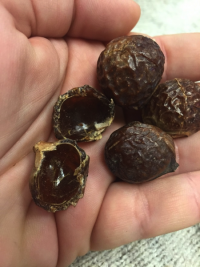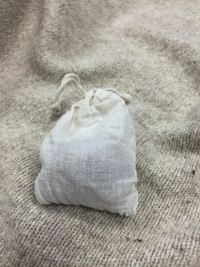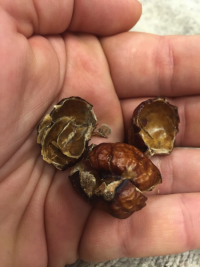
Don’t Throw Your Health and Virility out With the Wash Water
- Is this everyday task harming your reproductive organs and slowly reducing your virility?
- Wait… that man fish is now part lady fish? Yep. Find out why.
- Two natural solutions to help combat hormone disrupting chores.
A couple weeks ago, Jasmine LeMaster, chief of quality assurance here at Living Well Daily, and I were talking about the GMO Shopping Guide she’s diligently working on.
As we skimmed through different topics we’ve researched so far, household cleaning products came up.
Unfortunately, many cleaning products contain dangerous chemicals and toxic ingredients.
And since I haven’t exactly been shy about voicing my distaste for chemicals around the health quarters, she asked me for some suggestions. I will share a few of these suggestions for a specific chore in bit.
As our conversation went on, it became pretty obvious one common chore stood out from the rest as possibly being the most lethal. And it may surprise you.
On average, most of us do this chemical-laced task about eight times a week.
Actually, it’s so common, I’ve already done it today.
But what makes it more alarming — the dangers don’t end with completion of the chore.
The chemicals used stay in our environments and penetrate the fabrics our families wear, sleep on, and even dry our dishes with.
And what is worse, these chemicals are absorbed into our bodies through the nose, mouth, and skin. Skin is the largest and most exposed organ of your body, thus making exposures completely unavoidable.
And believe me, these chemicals are nothing to mess with — endocrine disruptors (also called “gender-bending” chemicals).
They are associated with some pretty terrifying health endpoints. In today’s issue, we will wash out what keeping clean sheets means for you.
Plus, a few tips on how to reduce their quantities in your home.
First, let’s uncover what this necessary chore is and how its products may already be affecting your body.
Dangerous Suds
Laundry is the health-ruining chore Jasmine and I were discussing — and not just because it can be time-consuming and annoying.
Laundry detergents and fabric softeners are full of synthetic chemicals, fragrances, and additives. Some of these can cause all sorts of negative health impacts on you and your family.
There are many chemical offenders in these products. I am going to highlight one of the most dangerous today. (Stay tuned to Living Well Daily for a full list of chemicals to avoid in the upcoming GMO Shopping Guide.)
Let’s get started…
The origins of health-hazardous petrochemical laundry soaps began during World War II. As fats and oils were made into explosives instead of cleaning products, scientists figured out how to turn petroleum into synthetic soaps, resulting in the creation of laundry detergent.1
One of the largest groups of sudsy offenders are nonylphenol ethoxylates (NPEs). These health and environment destroyers of the synthetic detergent world are currently banned in the European Union and Canada due to their endocrine-disrupting properties and environmental consequences.
However, here in America, we use anywhere between 270-370 million pounds of NPEs annually.2
While NPEs are allegedly biodegradable, they take a long time to break down in the environment and often turn into health-harmful chemicals during the degradation process.
Some of these chemicals cause endocrine disruption. Because endocrine disruptors mimic estrogen hormones, exposures can lead to reproductive issues, hence their nickname — “gender-bending” chemicals.
If NPE breakdown chemicals are absorbed into the body (through the skin, mouth, or lungs), the body cannot distinguish between the synthetic substance and actual estrogen.
Doing laundry with these also releases them into local watersheds, where they wreak havoc on aquatic creatures.
In fact, male rainbow trout exposed to NPEs in a lab setting become part male and part female. This is true in winter flounder, oysters, and salmon as well. Exposure can also lead to decreases in testicular growth, lower sperm counts, and damage to the kidneys and livers for fish.1
Yikes!
As terrifying as it is to hear NPEs are reproductively altering some of our aquatic brethren (and part of on our food chain), it’s even more disturbing to hear what it’s doing to mammals — specifically humans.
One study showed NPEs cause changes in the human placentas. These changes may result in fetal defects or early pregnancy termination.3
But the dangers don’t stop there.
While there haven’t been any studies on male humans, it makes one curious if the same symptoms found in fish translate, in some form, to men.
Research on other endocrine disruptors have found exposure to environmental estrogens may lead to infertility, prostate cancers, and testicular dysgenesis syndrome. 4
Furthermore, high levels of estrogen in men can increase breast tissue growth and lead to erectile impotence.5
Are those “mountain fresh” scented sheets really worth all those health effects?
Probably not.
While the jury is out on the official health effects of NPEs and their breakdown forms in human, it’s likely safest to avoid them.
And no, this doesn’t mean you have to go without washing your clothes.
Break Free of NPEs
I haven’t used standard laundry detergent in many years.
And as it turns out, Jasmine hasn’t either.
However, we still have very clean clothes. Though we use different cleaning methods — I will share them both in a moment.
And the best part? They aren’t laced with gender-bending chemicals.
While many store-bought product tout they are safe and biodegradable, they still may contain NPEs or other endocrine disruptors.
And even if they are truly free of NPEs, they may still contain health-damaging synthetics.
It’s very important to read your labels in the laundry aisle to see exactly what is in your detergents. If there is something you aren’t familiar with, look it up and find out what kind of health impact it may have on you.
Or do what we do here at Living Well Daily and avoid it.
Here is what we do instead…
The Natalie Method:
I use 1/8 cup of Dr. Bronner’s Castile Soap in the detergent drawer and 1 cup of baking soda in the load. I have an HE machine, so I don’t have to use a lot of Dr. Bronner’s. If you have a standard machine, use ¼-1/2 cup instead. This is my recommendation for a full load. Adjust quantity for load size.
Dr. Bronner’s is synthetic free and a very strong soap. The liquid form is available in a variety of essential oil-based fragrances. I use the lavender, and it really makes my clothes smell nice. The addition of baking soda helps with odor control as well as softening clothes.
You can buy Dr. Bronner’s here.
The Jasmine Method:
Jasmine uses soap nuts.
Soap what?
That is exactly what I said when she told me her laundry method.
Soap nuts, also called soap berries, are a natural fruit that comes from trees. Their husks contain saponin. Saponin creates a soaping effect. The husks are dried and then used as laundry cleaner.
After she told me about them, I became very curious. So I ordered some.
I was really impressed with how well they worked. My clothes were very clean and had a very faint fresh smell that is natural to the berry.
All you have to do is add three-five soap nuts to a muslin bag and toss in the wash!

Unused soap nuts ready to go in the wash bag.
New soap nuts will look like the ones above. You can see the shiny saponin inside.

Soap nuts in a bag ready to do their magic in the wash.
The bagged soap nuts go directly into the load. The bag and nuts need to dry if you aren’t doing consecutive loads. You can just take them out and place them on top of your washing machine. It’s not an issue if they accidentally end up in the dryer.

These soap nuts are past their prime.
The soap nuts above have made it through five wash cycles. It is time to replace them. Once they start to loose shape and inside luster, it’s time to get some new ones in your wash!
You can buy soap nuts here. There are liquid alternatives if you don’t think the nuts are a good fit for you. The liquids can replace all types of household cleansers, as well.
Laundry dangers don’t stop at the washer. Dryer sheets may be the worst toxin in your cleaning cabinets. We will dig into them and some healthy alternatives in an upcoming article, so stay tuned!
If you have any healthy laundry hacks, write me!: nmoore@lfb.org
Live well,

Natalie Moore
Managing editor, Living Well Daily
Sources
[1] Do You Know What’s in Your Laundry Detergent?
[2] Nonylphenol (NP) and Nonylphenol Ethoxylates (NPEs)
Action Plan
[4] The Effect of Environmental Estrogens on Men’s Health
[5] Signs and Symptoms of High Estrogen
Written By Natalie Moore
Natalie Moore is a dedicated health researcher with a passion for finding healthy, natural, and science-based solutions. After a decade of direct healthcare experience in western and natural medicine, she was involved in public health research before joining Living Well Daily.
View More Free Articles
Stop Obsessing Over Diet Trends
Can we stop with the endless diet debates already? Every other week there’s a new headline shouting about which diet is best for weight loss, heart health, or diabetes. Paleo, keto, low-carb, high-protein… it’s exhausting. And now, a new meta-analysis is out comparing the Mediterranean diet, the DASH diet, and something called AHEI (that’s “Alternative...
A New Reason to Ditch Processed Junk
If you’ve ever walked the inside aisles of your local grocery store and thought, “This is all just junk,” your instincts were spot on. A new study published in the journal Thorax just added another red flag to the list of dangers linked to ultra-processed food—a 41 percent higher risk of lung cancer. That’s right....
When Being Winded on Stairs Is Serious (And When It Isn’t)
I had an athlete visit me recently because he experienced shortness of breath while climbing stairs. He is in great shape, so he was worried about what it might mean. “Doc,” he said, “I run five miles three times a week. Why am I huffing and puffing after two flights of stairs?” His concern is...
Study EXPOSES Hidden Danger Lurking in Your Car
We think of our homes and cars as safe havens. But according to a startling new study, they may be flooding your lungs with microscopic plastic particles—every single day. Researchers in France recently found that adults inhale an average of 68,000 microplastic particles daily from indoor air alone. To put that in perspective, that’s about...
Mailbag: Is Modern Food Making You Snore?
“What can cause snoring, and is there a way to correct this issue?” —Seeking Silence Hi Seeking, Snoring happens when the soft tissues in your throat relax and vibrate as air passes through during sleep. While several factors can cause snoring—from sleep position to nasal congestion—I want to share one trigger that might surprise you....
Simple Food Swap SLASHES Dementia Risk 28%
Let’s be honest… who would jump at the chance to cut their dementia risk by 28 percent. And no, you don’t need to run marathons, survive on broccoli, or learn to play the zither (whatever that is) to make it happen. All it takes is one easy swap—something that’s probably already in your refrigerator. Researchers...
This SMART Floss Exposes Hidden Health Danger
Scientists have created dental floss that doesn’t just clean between your teeth—it also tracks your stress while you’re flossing. Now, I know what you’re thinking… “Great—now even flossing is going to stress me out by telling me how stressed I am.” But this fascinating new tool from Tufts University could be a game-changer for understanding...
Is This "Safe" Sweetener Damaging Your Brain?
The headlines are alarming… “Popular Sugar Substitute Linked to Brain Cell Damage” and “Erythritol Could Damage Critical Brain Barrier” are just two of the dozens I’ve spotted recently. But before you toss every sugar-free product in your pantry, let’s take a closer look at what this study actually shows—and what it doesn’t. The latest research...
This Summer Threat Could SPIKE Your Blood Sugar
Picture this… It’s another scorching hot summer day. You crank up the air conditioning while watching the weather forecast, which predicts yet another “record-breaking” heat wave. It’s starting to feel like just another miserably uncomfortable summer. But what you might not realize is that—if you have diabetes—those rising temps could do far more damage to...
Move Over Yogurt—5 Foods That Pack MORE Probiotics
Let’s talk about your gut. The microbiome is the collection of trillions of bacteria and other tiny organisms that live in and on your body—especially in your gut—and help keep you healthy. I’ve written often about how vital it is to maintain a healthy microbiome. And you might have dutifully added yogurt to your shopping...









